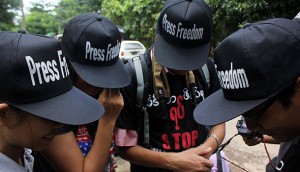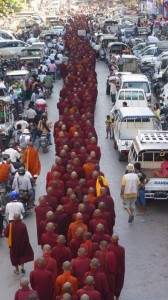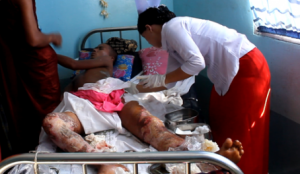Posts Tagged ‘Freedom of Expression’ (113 found)
Myanmar: Ministry’s Draft Press Bill Would Restore Prior Censorship and Full Government Control
A draft press bill put before parliament by the Minister of Information and Communications should be withdrawn or rejected when it has its first reading in June as it would be a major step backwards for freedom of expression and freedom of the media, restoring prior censorship and full governmental control over the press […]
• • •Retrograde Bill Threatens Tentative Progress
Although eight privately-owned dailies are to be launched on 1 April in a development that is without precedent in the past 40 years, Reporters Without Borders is very concerned about a proposed new law on printing and publishing that was submitted to parliament on 4 March […]
• • •Burma/Myanmar: New Forms of Control and Threats to Freedoms of Expression, Assembly and Association Amidst Reforms Fanfare
An international fact-finding mission was conducted by Asian Forum for Human Rights and Development (FORUM-ASIA) on 24- 30 October 2012 to assess the situation of freedoms of expression, assembly and association in Burma, against the backdrop […]
• • •Draft Media Law a Step Backward for Burma
Draft legislation designed to govern the media in Burma threatens to reverse fragile press freedom gains recently achieved under President Thein Sein’s democratic reform program, the Committee to Protect Journalists said today […]
• • •Myanmar: Press Bill Falls Far Short of International Law and Would Leave Press Open to Abuse
Despite promises of reform, a new press bill to be presented in parliament retains a vagueness that will leave the print media open to abuse from the government and other powerful actors.
The draft Press Law Bill (2013) says that the media should become “a fourth pillar” of democracy “watching and guiding the other three”. The media will not however become a fourth pillar under this draft because it undermines their role and overly restricts their work […]
• • •Burma Continues to Repress Critical Voices
 According to Freedom House’s annual global survey on political rights and civil liberties released this week, Burma is still rated as “Not Free.” A “Not Free” country is one where basic political rights are absent, and basic civil liberties are widely and systematically denied.
According to Freedom House’s annual global survey on political rights and civil liberties released this week, Burma is still rated as “Not Free.” A “Not Free” country is one where basic political rights are absent, and basic civil liberties are widely and systematically denied.
This could come as a surprise after the reforms that President Thein Sein and his government have started implementing but as Freedom House explains freedoms of expression and association improved in the last two years “but they depend more on current government policy than on deep institutional changes.”
One of the noticeable areas of reform is freedom of information. Thein Sein released bloggers and journalists, ended pre-publication censorship, and authorized the publication of privately-owned dailies. Regrettably, as explained in a report released this week by Reporters Without Borders, “as things stand, the possibility of the reforms being perverted cannot be ruled out.” The Press Scrutiny and Registration Division is still in place and can suspend any weekly that publishes “forbidden” content, there is no law providing protection to media and journalists, the old oppressive laws remain unamended and privately owned weeklies have been facing legal proceedings […]
Burmese Media Spring
This report examines the state of the changes carried out by the government and offers detailed recommendations designed to improve respect for freedom of information in Burma and ensure that the improvements are lasting […]
• • •Protest and Persecution Under the Guise of Reformist Laws
 Last week saw protests spread across Burma against the deplorable treatment by the authorities against those who dared to oppose the Letpadaung copper mine. The reaction of the government was all too familiar, with more monks arrested for their participation in peaceful demonstrations.
Last week saw protests spread across Burma against the deplorable treatment by the authorities against those who dared to oppose the Letpadaung copper mine. The reaction of the government was all too familiar, with more monks arrested for their participation in peaceful demonstrations.
The incident at the Letpadaung copper mine near Monywa, Sagaing Region, saw riot police brutally break up an 11-day protest by activists and monks against the mine that is forcing people off their land and causing major environmental damage. The police stormed the protest camp in the middle of the night, used tear gas and incendiary devices to break up the rally and injured at least 65 monks, while arrests of activists were made in Rangoon.
Since the crackdown, in scenes reminiscent of the 2007 Saffron Revolution, thousands of monks marched peacefully down main streets of Rangoon, Mandalay, Myingyan, Monywa and other towns and cities. They demanded an apology for the violence from President Thein Sein, the unconditional release of those arrested, and legal action against the perpetrators of the violence. Their courage in the context of the threat of serious violence is typified by Abbot Thawbita, one of the monks demonstrating in Mandalay, who said, “We believe that if we accept this violence now, we will have to face more serious suppression.” Union Minister Hla Tun has apologized to some of the injured monks in a ceremony in Mandalay on 15 December, but this falls short of the monks’ demand that the President himself apologize. Meanwhile, those protesters arrested in Rangoon on 26 November and 2 December have been released on bail,but still face charges of inciting public unrest […]
Protests and Arrests Rise in November – Threatens Freedom of Expression
 A series of both improvements and setbacks highlighted an eventful month in Burma. While advancements in international recognition made worldwide news, human rights violations persisted with far less global interest. News coverage focused on a historic visit from President Obama, and paid little attention to issues such as the government’s violation of freedom of assembly. Even as Burma stood on the world stage, the government continued a merciless crackdown on peaceful protesters.
A series of both improvements and setbacks highlighted an eventful month in Burma. While advancements in international recognition made worldwide news, human rights violations persisted with far less global interest. News coverage focused on a historic visit from President Obama, and paid little attention to issues such as the government’s violation of freedom of assembly. Even as Burma stood on the world stage, the government continued a merciless crackdown on peaceful protesters.
Among the cases of human rights violations in Burma throughout November, the blatant and unwarranted abuse of landowners and other civilians over the peaceful protest of the Letpadaung copper mine stands out as a particularly egregious offense. Since the government seized 7,800 acres of private land for the copper mine, the Burmese people have continued to exercise their right to assemble but have been met with unprovoked force […]
Burma: Continued Violations of Fundamental Freedoms and New Forms of Control Expose the Empty Façade of Reforms
Human rights protection in Burma will remain illusory if fundamental freedoms of expression, assembly and association are not properly safeguarded in the current legal reforms in Burma, warned the Asian Forum for Human Rights and Development […]
• • •








 All posts
All posts